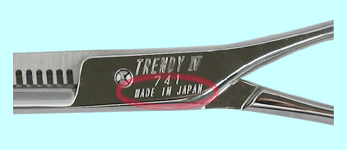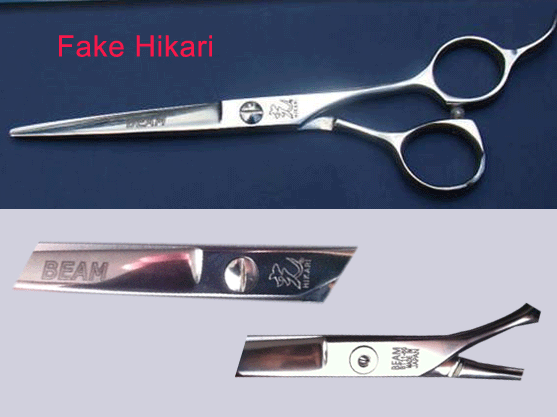Frequently Asked Questions, Industry News & General Scissor Information:
Here are some of the most frequently asked questions that we have received in our 50+ years of business in the USA. We will also discuss the latest scissor trends, industry news and anything else of interest for the professional stylist.
Japanese Scissors, Japanese Steel, Country of Origin, what does it all mean? Why should I care?
Haircutting scissors made in Japan have a history and reputation for being higher quality than scissors made in other countries such as China, Germany, Korea, Pakistan, and Taiwan. While there may be exceptions to this generalization, Japan is commonly viewed as the preferred country of origin for high quality scissors. Correspondingly, all Hikari scissors are hand made in Japan.

Don't Be Fooled: Appearances can be Misleading
Unfortunately, there are scissor companies that frequently use tactics designed to imply their scissors are made in Japan, when in fact they are not. Listed below are just a few of the most common manufacturing and distribution tactics that mislead stylists into believing they are purchasing a Japanese-made scissor:
A Japanese theme is used to market the scissors, but the scissors have no affiliation with Japan
Examples include utilizing Japanese letters (also known as Kanjis), words, names, or symbols on a company website, literature, and on the scissors. There are companies that have elaborate booths at beauty shows and the salespersons who claim to sell "Japanese scissors" but in reality, the scissors are not made in Japan.
Japanese Steel Made in Japan
A scissor made of Japanese steel may not be made in Japan. Frequently, scissor factories located in various countries claim to use Japanese steel in their manufacturing processes. Additionally, companies incorrectly advertise such scissors as being Japanese, when in fact only the steel was made in Japan. This would be similar to portraying a wine as French because a factory and vineyard located in Mexico, which designed, fermented, produces, and bottled the wine, used grape seeds imported from France.
Tempering, like growing of grapes for wine, is one of the most important steps in the steel making process, and how and where the tempering is performed is crucial. A scissor made of Japanese steel tempered outside of Japan will not feel the same as a scissor tempered in Japan. Furthermore, the difference in feeling will become more apparent as the scissor is used. Scissors tempered in Japan by Japanese experts are of the highest quality.
Scissors are embossed with markings such as Japan steel, Japan cobalt, Japan 440C, and Japan forged steel
Such markings merely indicate that a raw material obtained from Japan is used in the scissor, but it does not mean that the majority of the materials used in the scissor are from Japan or that the scissor was manufactured in Japan. While Japanese stainless steel is generally considered the highest quality steel, it is the craftsmanship required to design, hone, and balance the steel that is the critical key to the most expensive factor in making a quality scissor.
Scissors fail to bear a permanent country of origin label
In accordance with the law, legitimate scissor companies will ensure their scissors bear the true country of origin (e.g. Japan, China, Korea, Taiwan, Germany, Pakistan). Beware of any scissor company that does not stamp the true country of origin on all their scissors. As mentioned above, markings such as Japan steel, Japan Cobalt, Japan 440C, Japan ATS-314, and Japanese Forged Steel are not the country of origin.
Counterfeit scissors are advertised as new or used Hikari scissors
Unfortunately, there are companies that specialize in making fake Hikari scissors. Below is a picture of a fake Hikari offered for sale on EBay and on a scissor website. This counterfeit scissor actually bears the name "Hikari" and the Hikari logo. It also has the model name "Beam" stamped on the blade in order to mimic an actual Hikari Beam scissor. The back side of the scissor is marked "Made in Japan". This scissor is actually an inexpensive, low quality scissor made in China, probably worth $80 at best, and was offered for sale at $250.

Smart Shopping: Protect Yourself
The safest way to ensure a sound investment is to purchase scissors from a reputable company that has an extensive track record for quality, integrity, and reliability. There are many scissor companies that have been in operation for more than 20 years and are known for selling quality scissors at reasonable prices. In general, these companies identify their scissors' true countries of origin and stand behind their products with proven customer service.
Unfortunately, there are scissor companies, most in operation for less than 5 years. that claim to offer the newest and greatest metals, craftsmanship, and features, but they do not deliver. Some of these companies tout a supposed past or current affiliation with Hikari or other established manufacturers that cannot be confirmed. Such companies try to lure customers with low prices and scissors that are only visually appealing but fail to live up to expectations. As a result, many of these new scissor companies fold after a few years or morph into another "new" scissor company.
We recommend that you put your trust in companies with proven track records for high quality products that provide sustained performance and customer satisfaction. We believe that such companies will be eager to help you find the scissor that fits your desires, needs, and budget.
Questions to Ask: Proof is in the Use
In order to verify a company's reputation, here are some questions that stylists should ask and verify the responses. Reputable companies also have unpaid, verifiable references and endorsements and will gladly provide you with contact information for their reference.
• How long has this company been in operation?
There are many scissor companies who have been in business for more than 20 years, and their track record speaks for itself. (Hikari has been hand making haircutting scissors in Japan since 1968).
• What is the scissor's country of origin?
Beware if the answer is the scissor is made out of Japanese steel. If a scissor is made in Japan, it will be stamped "Japan" or "Made in Japan". If it does not have such stamp, it is not made in Japan. (All Hikari scissors are made in Japan).
• What is the name and location of the scissor manufacturing plant that produces the scissor?
(Hikari scissors are made in Niigata Japan at the Hikari Factory). Be certain the answer is the location of the scissor plant, not the steel plant. The most important factor is where the scissors are created.
Call for Help: Better Safe than Sorry
While we truly believe Hikari scissors are the finest scissors in the world, we respect our competitors that operate in an ethical fashion and would never disparage their businesses or products. In contrast, we find it upsetting to see scissor companies that deploy deceptive marketing tactics or make false claims as these illegal practices hurt consumers and are a detriment to the entire beauty industry. Please don't hesitate to contact us should you suspect someone is marketing or selling counterfeit Hikari scissors.